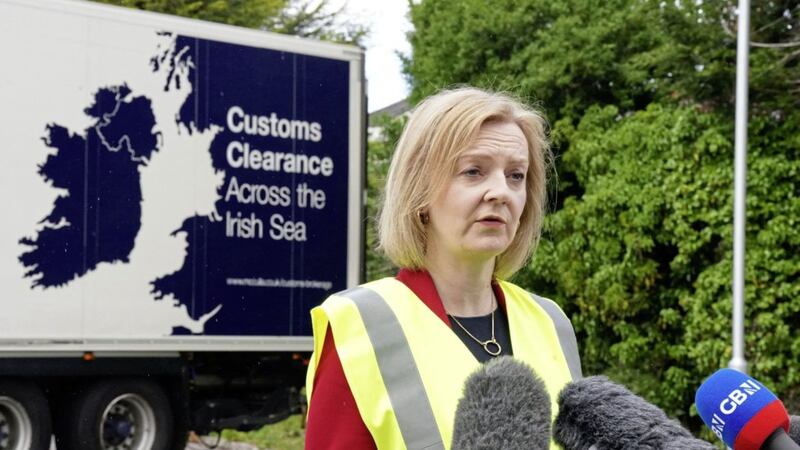There is far less time to advance a bill against the protocol than is widely realised.
Westminster’s summer recess and the party conference season mean the Commons and Lords are only sitting for 10 weeks between now and the end of October, when Stormont’s ‘caretaker’ period expires and an assembly election must be called.
Tabling of the bill has slipped by a week already, as the cabinet argues over it around a weakened prime minister. It will not have to slip back much more before the July 21 summer deadline is in sight, after which there are just four weeks of parliamentary time until Stormont collapses.
Exactly a year ago, amid the DUP leadership crisis, it was considered urgent to pass the Stormont stability reforms agreed in New Decade, New Approach. The government promised to rush through legislation, already tabled in May. But after missing the July deadline nothing happened again until the final week of October and the bill was not passed until this January.
That was straightforward legislation in motion, with cross-party support in London, Belfast and Dublin.
What chance does the DUP have of seeing timely progress, let alone passage, of a bill so contentious even the cabinet cannot agree on it?
**
Techniques to subvert the DUP’s Stormont boycott continue to evolve. Another assembly recall petition has been put forward, two weeks after the last, this time by People Before Profit. Petitions have to specify what the assembly is being recalled to debate, so although the DUP can prevent any business by refusing to nominate a speaker, every party still has to gather in the chamber for a public spectacle of what the DUP will not let them discuss.
The last petition, from Sinn Féin, was a broad call for “the urgent appointment of ministers”. The DUP responded with a broad defence of its boycott.
People Before Profit’s petition is highly specific, seeking support for striking Caterpillar workers.
This could be trickier to dismiss. Caterpillar is a major employer in Larne, where the DUP’s political pre-eminence is not as secure as often presumed.
**
The ultimate absurdity of the DUP’s boycott is how the DUP is trying to subvert it.
In the first recall debate, the UUP revealed it had written to the head of the civil service proposing a cross-party virtual meeting to attempt some preparatory work on a programme for government. Paul Givan, the DUP’s former first minister, turned up at the meeting.
When Michelle McIlveen, the DUP’s caretaker education minister, announced a summer holiday extension for free school meals, Sir Jeffrey Donaldson tweeted “this proves that current ministers can make these kind of decisions to support hard pressed households with the cost of living”.
Tweet and meeting both happened hours after a LucidTalk poll showed 52 per cent of DUP voters back the party boycotting Stormont until the protocol is significantly changed and another 40 per cent back it until the protocol is completely removed. Yet Sir Jeffrey has never promised to remove the protocol, only “the sea border” - and the boycott was only meant to affect the executive, until TUV leader Jim Allister demanded the assembly be blocked as well. The DUP is reckoning with a unionist electorate it has wound up into a more hardline position than the party itself.
**
One of the favourites to replace Johnson is trade minister Penny Mordaunt.
She has been best known in Northern Ireland until now for strongly advocating the provision of abortion services here, by Westminster override if necessary.
In 2018, as minister for women and equalities, she led what was described as a revolt of senior Tory women against Theresa May’s reluctance to legislate over the DUP’s head. In 2019, when Johnson and Jeremy Hunt were running to succeed May, she said whoever won would have to replace Northern Ireland’s “appalling” abortion laws. Mordaunt had endorsed Hunt, who favoured restricting abortion laws in Britain, so her intercession was seen as particularly strong. Among those welcoming it was Amnesty Northern Ireland, which will only praise a Tory under exceptional circumstances.
**
The PPS is to prosecute three companies for alleged health and safety breaches following the 2018 Primark fire in Belfast.
None of the prosecutions relate to causing the blaze. The alleged failings were discovered by the Health and Safety Executive while investigating the fire and it is empowered to send a file to the PPS.
While four years might seem like a leisurely pace to reach this stage, it is fast and fastidious compared to the 2004 North Street Arcade fire. There is still no sign of any prosecution, or even any serious investigation, into what may be the largest single non-Troubles crime against property in Belfast’s history.
**
Tiresome attempts have been made to stir up a protocol controversy over phone chargers. The EU is to standardise the USB-C plug and this decision will automatically apply to Northern Ireland but not Britain. However, there will be no socket sea border in practice as every device manufacturer - including in Britain – will want to make a plug that can be sold in the EU.
The only possible confusion in Northern Ireland is if USB-C also ends up referring to the Ulster Scots British Commissioner.









